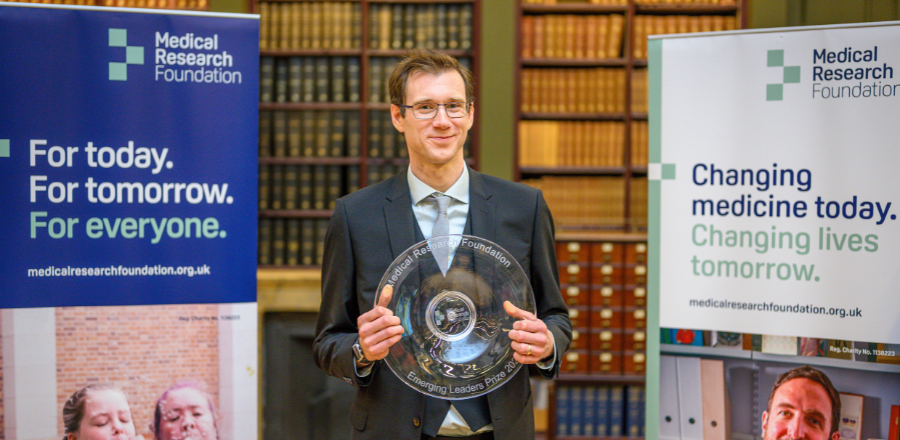Liver disease expert wins Medical Research Foundation Emerging Leaders First Prize

The Medical Research Foundation has awarded Glasgow Caledonian University’s Dr Hamish Innes the coveted Emerging Leaders First Prize, recognising him as a future leader in hepatitis research.
Dr Innes, a Research Fellow in the School of Health and Life Sciences’ Research Centre for Health (ReaCH), was awarded £100,000 to further his life-saving research into hepatitis C antiviral therapy.
He beat Oxford and Glasgow universities to the top prize. Dr Azim Ansari, from the University of Oxford, won second prize and Dr Joe Grove, from the University of Glasgow, was highly commended.
Hepatitis is an inflammation of the liver. There are five main strains of the hepatitis virus, referred to as types A, B, C, D and E. In particular, types B and C (HBV and HCV) are the most common cause of liver cirrhosis, liver cancer and viral hepatitis-related deaths.
An estimated 354 million people worldwide live with HBV or HCV, and better options for diagnosing and treating hepatitis are needed to help prevent the 1.4m deaths that occur each year worldwide.
While existing treatments can lead to a cure, the prospect of life-long antiviral therapy can lead to a number of complex challenges.
The Medical Research Foundation awarded Dr Innes first prize for his “outstanding” research into tackling both viral and autoimmune hepatitis at a special prize-winners award ceremony in London on Wednesday, November 22.
The Emerging Leaders Prize awards are designed to support research leaders of the future with flexible funding that can be used to enhance career development as well as their research.
With expertise in epidemiology, statistics, genetics and analysis of linked health data, Dr Innes has led vital research into HCV antiviral therapy.
Funded by a Foundation Fellowship, and through large population cohort data which included patients from HCV Research UK, Dr Innes has shown that antiviral therapy reduces risk of death and severe liver disease for HCV patients.
This data has influenced policymakers, instigating scale-up programmes for antiviral treatment, to work towards HCV elimination.
Despite improvements in treatment, people with HCV cirrhosis remain at high risk of dying from liver cancer after their HCV infection is cured. Most of these liver cancer deaths could be averted by detecting the liver cancer early when it is smaller, and therefore much easier to treat.
Dr Hamish Innes’ research is now exploring how clinical prediction models, like risk calculators, could improve early detection of liver cancer in patients with HCV.
Risk calculators are used widely by health professionals to generate a 'score' which estimates the likelihood of individuals developing certain diseases. These scores aid decision making in clinical practice and guide the type of treatments that health care professionals prescribe.
Dr Innes will use the Emerging Leaders Prize funding to access new datasets, allowing him to strengthen the evidence base for liver cancer surveillance in HCV patients and continue research into the genetic predictors of liver cancer.
Ultimately, Dr Innes’ ambition is to lead a data science team that will tackle the biggest challenges in liver disease and viral hepatitis over the next 25 years.
Dr Innes said: “It was absolutely amazing to win this Emerging Leaders Top Prize and hugely exciting in terms of my research. I still cannot believe it. It’s fantastic news and huge kudos, not just for me but for this University.
“I’m going to use the money to expand my access to date sets that have the potential to change practice and policy.
“This will be a launchpad to allow me to build my own data science team at the University. The vision would be to connect personalised medicine with liver disease and viral hepatitis, and put those two things together.
“About 16,000 people die in the UK from liver disease every year. Many of those deaths could be avoided. It’s not so much that we don’t have the right treatments, it’s that we are not able to target the treatments that we have to the right patients.
Personalised medicine is about considering patients as individuals and moving away from a one size fits all decision-making approach. We need more innovation and progress in this area.”
Dr Angela Hind, Chief Executive of the Medical Research Foundation, said: “We want to continue making a difference to the study of hepatitis by supporting the research leaders of the future, and our 2023 Emerging Leaders Prize-winners are all making a significant impact in this field.
“By investigating the fundamental causes of hepatitis and the way we treat it, their research could lead to much-needed new approaches to diagnosis and treatment. In turn, these advances could significantly improve the lives of patients living with hepatitis and hepatitis-related illness.”
